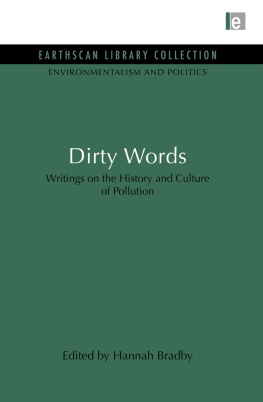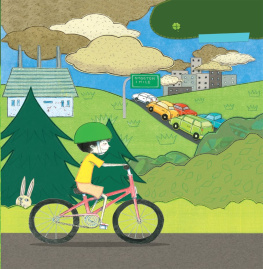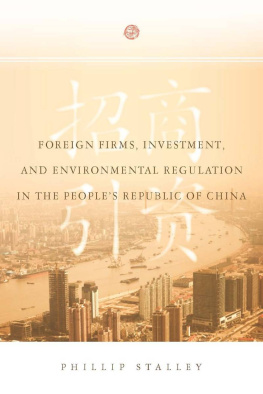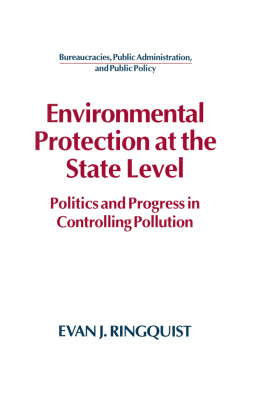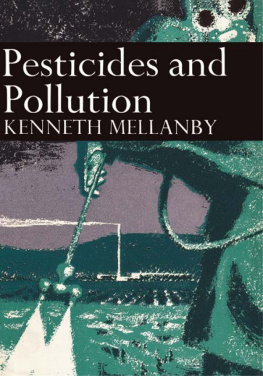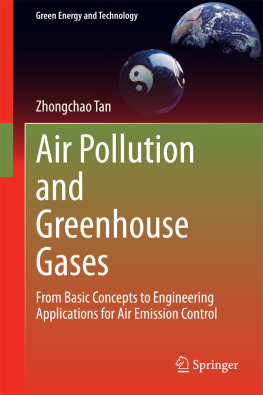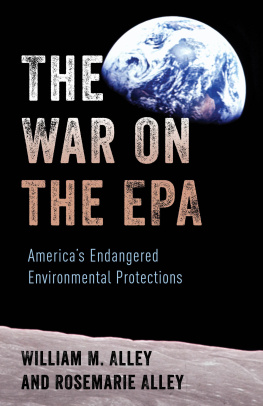ENVIRONMENTALISM AND POLITICS
Volume 2
Dirty Words
Writings on the History and Culture of Pollution
Full list of titles in the set
ENVIRONMENTALISM AND POLITICS
| Volume 1: | When the Bough Breaks |
| Volume 2: | Dirty Words |
| Volume 3: | Fax |
| Volume 4: | World Who is Who and Does What in Environment and Conservation |
| Volume 5: | Environmental Law and Citizen Action |
| Volume 6: | British Politics and the Environment |
| Volume 7: | Waste Not Want Not |
| Volume 8: | The Earthscan Action Handbook for People and Planet |
| Volume 9: | Richer Futures |

First published in 1990
This edition first published in 2009 by Earthscan
Copyright 1990 Hannah Bradby, Simon F. Watts, Philip Stewart, Wlater C. Patterson, Nigel Dudley, Janet Rowe, Peter Brimblecombe, Michael Thompson, Brian Wayne
All rights reserved
ISBN 978-1-84971-003-9 (hbk Volume 2)
ISBN 978-0-415-84706-3 (pbk Volume 2)
ISBN 978-1-84971-001-5 (Environmentalism and Politics set)
ISBN 978-1-84407-930-8 (Earthscan Library Collection)
ISBN 978-1-1340-5889-1 (ePub)
For a full list of publications please contact:
Earthscan
2 Park Square, Milton Park, Abingdon, Oxon OX14 4RN
Simultaneously published in the USA and Canada by Earthscan
711 Third Avenue, New York, NY 10017
Earthscan is an imprint of the Taylor & Francis Group, an informa business
First issued in paperback 2013
Earthscan publishes in association with the International Institute for Environment and Development
A catalogue record for this book is available from the British Library
Library of Congress Cataloging-in-Publication Data has been applied for
Publishers note
The publisher has made every effort to ensure the quality of this reprint, but points out that some imperfections in the original copies may be apparent.
At Earthscan we strive to minimize our environmental impacts and carbon footprint through reducing waste, recycling and offsetting our CO2 emissions, including those created through publication of this book.
DIRTY WORDS
Hannah Bradby was born in Glasgow in 1966 and travelled widely throughout her childhood. She recently completed her studies in Human Sciences at Oxford University, and has been involved in grassroots political activism for many years.
First published in 1990
by Earthscan Publications Ltd
3 Endsleigh Street, London WC1H ODD
Copyright 1990 Hannah Bradby, Simon F. Watts, Philip Stewart, Walter C. Patterson, Nigel Dudley, Janet Rowe, Peter Brimblecombe, Michael Thompson, Brian Wynne
All rights reserved
British Library Cataloguing in Publication Data
Dirty words: writings on the history and culture of pollution.
1. Environment. Effects of civilization, history
1. Bradby, Hannah
ISBN: 1-85383-079-8
Designed by Sandie Boccacci
Production by Bob Towell
Typeset in 10/12 pt Garamond by Bookman Ltd, Bristol
Earthscan Publications Ltd is an editorially independent and wholly owned subsidiary of the International Institute for Environment and Development (IIED).
CONTENTS
Simon F. Watts
Philip Stewart
Walter C. Patterson
Nigel Dudley
Janet Rowe
Peter Brimblecombe
Michael Thompson
Brian Wynne
HANNAH BRADBY, EDITOR
The 1990s, we are informed by media style experts, will see a reaction to the greedy eighties and a development of the Green movement, which has been so profitable for retailers. But when there is no extra economic or political profit to be made from another phosphate-free or biodegradable product, will we move on to the next trend? It seems likely that we will, if the danger of environmental disaster is considered out of context, as an unprecedented planet-risking business. If we are persuaded to believe that buying an environment-friendly soap powder will help to prevent global destruction, and in fact life continues as usual even though most people continue to buy polluting products, how will we feel? Will we get bored or disillusioned with environmental issues, or will we feel in need of a new cause to fight for?
The present burst of activity over environmental concerns will be one more unfulfilled hype, unless it is put in context. This is not the first time the human population has felt under environmental threat, nor is it the first time humans have thoughtlessly destroyed natural resources. We need to place our daily worries in their historical and cultural context, as part of humankinds continuing relationship with its environment: part of a pattern of exploitation, for better or worse, that has been developing since life first evolved. When our own era is set in its proper context, we are better able to see which trends are unprecedented and to judge the degree of importance that should be given to events.
This collection of writings aims to fill in some of the context not supplied by the media hype of pollution. The first article, by Simon Watts, offers a pre-historical perspective on the question of whether the greenhouse effect is causing the current fluctuations in our climate. On the same geological timescale is Philip Stewarts consideration of whether we have a choice in the development of our climate, and if so whether the next ice age or a little greenhouse warming would be preferable. On a more intimate timescale, Walt Patterson gives a personal account of the last two decades of environmental campaigning and what, for him, is the end of an era. Nigel Dudley considers how the publics perception of pollution has affected the complexity of campaigns run by environmental pressure groups this century. Agricultural policy in the United Kingdom is examined by Janet Rowe, who asks whether pollution is the inevitable price of progress in food production. An unusual angle on air pollution is given by Peter Brimblecombe through an examination, from both cultural and historical perspectives, of its portrayal in literature. Two detailed studies of the sub-cultures surrounding aspects of pollution conclude the collection. Michael Thompson shows how the very term Hazardous Waste Management distorts our view of what it entails. Brian Wynne uses the effects of the Chernobyl nuclear accident on sheepfarming in Cumbria as a case history to illustrate the crucial problem of how scientific knowledge is communicated by the official experts to the individuals concerned in an environmental crisis.


